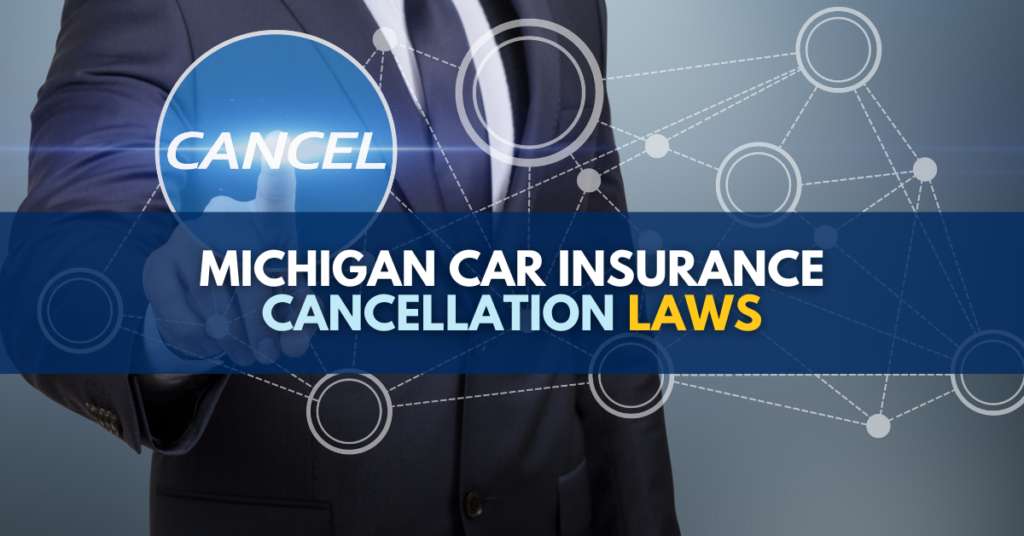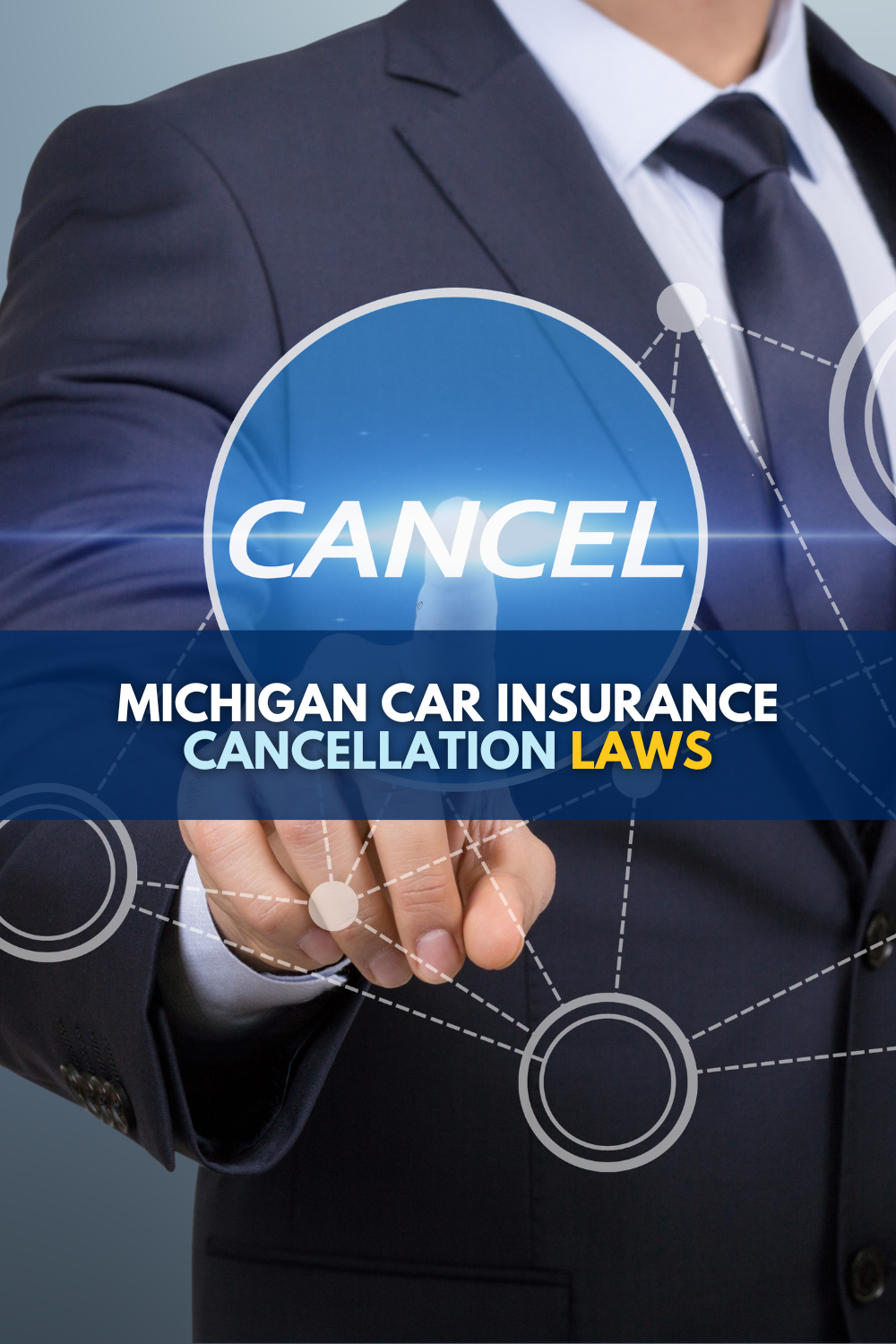
The Michigan car insurance cancellation laws determine the very specific ways in which your insurance company can cancel your policy. These include a specific set of rules for when a company can cancel a driver’s policy, the type and length of cancellation notice that must be given, and that a refund must be provided. They also address how a driver can cancel a policy.
According to the Michigan car insurance cancellation laws, when is a policy considered cancelled?
A policy is canceled when the policy is terminated during the policy period and before the policy has expired. Michigan law allows for coverage to be cancelled by either the company or the driver who purchased the policy.
Do the Michigan car insurance cancellation laws allow a driver to cancel coverage?
Yes according to Michigan law a car insurance policy “may be canceled at any time at the request of the insured.” When that occurs, the auto insurance company must “refund the excess of paid premium.” (MCL 500.3020(1)(a))
Can you cancel car insurance at any time?
Yes. The Michigan car insurance cancellation laws allow you – as the named insured on a policy – to cancel at any time.
Can a car insurance company cancel your policy?
Yes. A car insurance policy “may be canceled at any time by the insurer,” but only if the insurance company mails to the insured “a not less than 10 days’ written notice of cancellation.” (MCL 500.3020(1)(b))
The car insurance company may include the “excess of paid premium” along with the notice of cancellation, but it is not required to.
What happens if car insurance is cancelled?
If your policy is cancelled – and it is done in compliance with the Michigan car insurance cancellation laws – then you will no longer have any coverage under the policy. You will be entitled to a refund of any prepaid premiums for what would have been the balance of the policy term.
Do you get a refund when you cancel car insurance?
Yes. The auto insurance company must refund you the “the excess of paid premium” when you cancel your auto insurance. (MCL 500.3020(1)(a) and (b))
What to do if my car insurance is cancelled?
Immediately obtain and maintain a valid No-Fault auto insurance policy on your car because the criminal penalties and financial consequences of driving without auto insurance in Michigan are very severe.
What happens if a company does not follow the Michigan car insurance cancellation laws?
If the laws are not followed, then a canceled policy will not be effective and coverage under the policy will continue until the end of the policy term or until a policy a properly, lawfully canceled.
What are the Michigan car insurance cancellation laws for nonpayment of premiums?
In Michigan a company can cancel your No-Fault policy if you do not pay the premiums on your policy. But cancellation for nonpayment is effective only if: (1) your insurer provides the legally-required 10-day written notice of cancellation; and (2) the notice is mailed after nonpayment has occurred.
MICHIGAN CAR INSURANCE CANCELLATION LAWS UPDATE: The Michigan Supreme Court ruled unanimously in Yang v. Everest National Insurance Company that MCL 500.3020(1)(b) of the Insurance Code does not allow an auto insurance company to cancel a driver’s policy for non-payment of premiums by mailing “its customer a letter purporting to be a notice of cancellation for nonpayment of insurance premiums before any nonpayment actually occurred.” The justices added: “We hold that under MCL 500.3020(1)(b), a cancellation notice is effective only if it is peremptory, explicit, and unconditional. In this case, because Everest’s letter provided that cancellation was conditioned on Yang’s failure to pay his insurance premiums, the letter was ineffective as a notice of cancellation.”
How does cancelling a policy affect your claims?
Claims that predated the canceled policy are not affected. The Insurance Code states that “[c]ancellation . . . is without prejudice to any claim originating before the cancellation.” (MCL 500.3020(5))
What are the Michigan car insurance cancellation laws for liability policies?
Michigan laws provide that a canceled liability policy is effective only “if written notice of cancellation is mailed by certified mail, return receipt requested, to the insured” and notice is “mailed at least 20 days prior to the effective date of cancellation.” (MCL 500.3224(2) and (3))
The written notice must state the reasons for cancelling the policy and inform the insured that he or she has “7 days from the date of mailing” to appeal to the Insurance Commissioner. (MCL 500.3224(3))
Reasons for cancelling a liability policy
There are two specific reasons for cancelling a liability policy under the Michigan car insurance cancellation laws: (1) During the first 55 days of a policy, “the risk is unacceptable to the insurer”; and (2) The named insured or any other driver loses his or her driver’s license.
Michigan laws specifically provide that:
- “[N]o insurer licensed to write automobile liability coverage, after a policy has been in effect 55 days or if the policy is a renewal, effective immediately, shall cancel a policy of automobile liability insurance” unless “during the 55 days following the date of original issue thereof the risk is unacceptable to the insurer.” (MCL 500.3220(a))
- “[N]o insurer licensed to write automobile liability coverage, after a policy has been in effect 55 days or if the policy is a renewal, effective immediately, shall cancel a policy of automobile liability insurance” unless the “named insured or any other operator, either resident of the same household or who customarily operates an automobile insured under the policy has had his operator’s license suspended during the policy period and the revocation or suspension has become final.” (MCL 500.3220(b))
What are the Michigan car insurance cancellation laws for fraud?
Michigan law requires that companies provide notice to their insureds before terminating their policies and coverage if the policy canceled is based on alleged No-Fault fraud.
The Insurance Commissioner has ruled that policies allowing for cancellation without notice are unenforceable.
In an Insurance Bulletin entitled “Automobile Policy Cancellations for Fraudulent Claims,” the Insurance Commissioner ruled as follows:
- “It has come to the Director’s attention that certain automobile insurance policy forms contain provisions that impermissibly allow the insurer to rescind or terminate policies without notice when the insurance company denies a claim because the insured person has committed fraud in the making of a claim.”
- “Insurers should be aware that automobile policies may be terminated only in accordance with the applicable notice provisions in the Insurance Code . . . when the alleged fraud has occurred in connection with a claim (as opposed to fraud that occurs in the application for a policy).”
- “Specifically, [MCL 500.2123] and [MCL 500.3224] of the Code require an insurance company to provide a policyholder with 30 days’ notice for individual policies and 20 days’ notice for group policies if an insurer terminates policy because the policyholder has committed fraud in connection with a claim.”
- “Insurance policy form provisions that provide for termination or rescission without notice in the event of fraud in connection with a claim are not enforceable.”
When to cancel insurance after selling car?
Cancel your car insurance immediately upon selling your car. You are no longer the owner so you should not waste your money on insurance for a car you do not own. You also do not want to be added to a lawsuit if the subsequent new owner of the car causes a car accident that results in serious injury or death and you are construed as a constructive owner for liability purposes by continuing to pay for insurance for the car.
What do the Michigan car insurance cancellation laws say about reinstating a cancelled policy?
Michigan’s laws do not address reinstatement of a cancelled policy. Each auto insurance company will have its own rules to address this. However, auto insurance companies will often allow reinstatement once an insured pays all overdue premiums and late payment fees.
Can I cancel my car insurance if I pay monthly?
The Michigan car insurance cancellation laws allow a driver to cancel his or her policy “at any time.” (MCL 500.3020(1)(a))
Can I cancel my car insurance before it starts?
Although it is hard to imagine the circumstances that would prompt a driver to cancel his or her policy before it starts, the Michigan car insurance cancellation laws allow a driver to cancel his or her policy “at any time.” (MCL 500.3020(1)(a))
Do I have to pay to cancel car insurance?
No. You do not have to pay to cancel your car insurance.
Can you cancel car insurance on a financed car?
The Michigan car insurance cancellation laws do not address this issue. But the terms of your finance agreement most likely will require you to maintain continual No-Fault auto insurance coverage on your vehicle. Cancelling your insurance without having a new policy in place may violate your finance agreement.
Is it bad to cancel car insurance?
There is nothing in the Michigan car insurance cancellation laws that allows a company to penalize a driver for cancelling his or her policy or to refuse to insure such a driver. But if you plan to continue driving, do not cancel your car insurance without first getting a new policy in place.
Can I cancel car insurance after renewal?
You can cancel your policy after renewal because the Michigan car insurance cancellation laws allow you to cancel your policy “at any time.” (MCL 500.3020(1)(a))
Cancellation and renewal of liability auto insurance
If your auto insurance company refuses to renew your “automobile liability insurance,” it does not constitute “a cancellation” unless the insurance company mails you notice “20 days prior to the termination date of the policy” that “the policy will not be renewed.” (MCL 500.3204(2))
Appealing a car insurance cancellation
According to the Michigan car insurance cancellation laws, if your auto insurance liability policy was cancelled within 55 days of it being issued, then you cannot appeal the cancellation to the Insurance Commissioner. (MCL 500.3224(1)) Otherwise, you can “contest the grounds of [your] cancellation” by filing a written request with the Insurance Commissioner.
Your appeal must be filed “within 7 days after the date of the postmark” on the notice of cancellation that was mailed to you. (MCL 500.3230)
Need help? Call the auto accident attorneys at Michigan Auto Law
If you have been injured in a car accident and would like to speak with an experienced insurance lawyer, call toll free anytime 24/7 at (800) 968-1001 for a free consultation with one of our attorneys. You can also get help from an experienced accident attorney by visiting our contact page or you can use the chat feature on our website.



